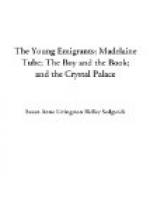CHAPTER VIII.
THE SALE.
“Lot 47,” cried the auctioneer, “a padlock and key.”
“Gentlemen, will you make an offer, the padlock is still very good, and no doubt cost at least a shilling. Who will bid?”
“Two-pence,” answered a voice.
“Two-pence,” repeated the auctioneer, “once. Two-pence, twice. Will no one bid higher? It is going for nothing, the key is worth more. Have you all done?”
While the auctioneer continued to invite the bystanders to offer more, the door opened, and Madame Tube entered, with Madelaine and Raphael, who held his arm in a sling. They stopped timidly at the entrance, when Raphael entreated his sister to lead him once more to Jacot. “Let me take leave of him,” he said. They made their way through the crowd to where the cage was placed.
“Jacot,” spoke Madelaine, in a low voice, as she raised a corner of the handkerchief which covered the cage. The bird chirped at the sound of the well-known voice.
“Do not touch that cage,” said a constable, roughly, and Madelaine let fall the handkerchief. At this moment, “Lot 42. A canary and cage,” was called, “a charming little bird,” continued the auctioneer, “yellow as gold, and sings like a nightingale. How much for the canary?”
Raphael’s heart beat violently, Madelaine hastened to count the money she had left. “Courage,” she whispered to Raphael, “make an offer stoutly, you can go to ten-pence, and perhaps they will let you have it out of compassion.”
“Six-pence to begin with,” said the constable.
“Seven-pence,” cried another voice.
“Eight-pence,” stammered poor Raphael.
“Nine-pence,” replied the other.
“Ten-pence,” said Raphael, gasping for breath.
The attention of those around was attracted to the poor boy, who with his arm in a sling, and pale as death, had his blind eyes turned towards the auctioneer, his countenance expressing intense anxiety.
A short but profound silence succeeded, then a number of questions were asked, the history of the poor child was told, every one felt moved with compassion, and no one would bid again for the bird, which was knocked down to Raphael for ten-pence.
Madelaine placed the cage in his hand, her eyes beaming with joy; he pressed it closely as a treasure without price, then quite overcome, he sobbed aloud.
As soon as the poor family had quitted the room, the sale of the other miserable articles continued, and last of all the old picture which used to serve to stop up the window, was sold at a high price to an artist, it having been discovered to be a painting of considerable value.
CHAPTER IX.
“When distress is greatest, help is nearest.”




